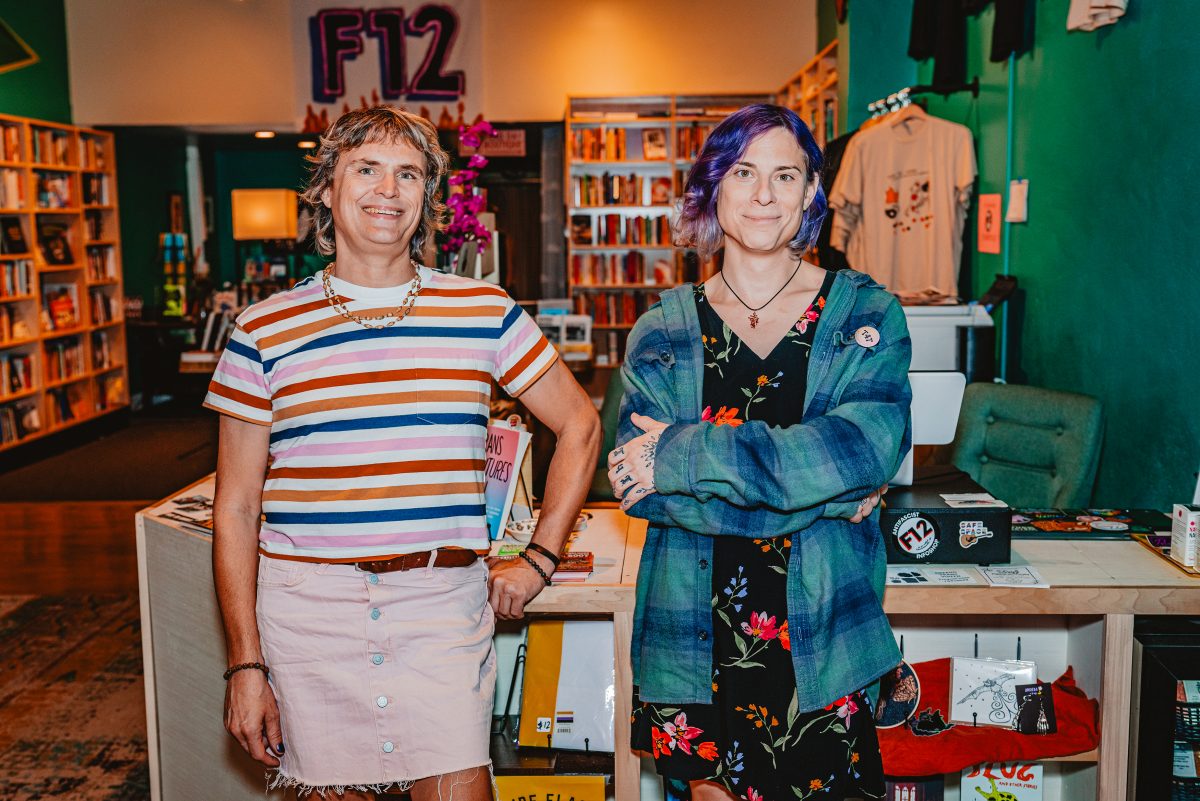Dozens of Charlottesville residents braved the rain on March 31 to attend the first-ever trans Q&A at The Beautiful Idea. While the weather outside was gloomy, the atmosphere inside the trans-owned, anti-fascist bookstore was cozy, with chairs set up under string lights, and pride flags draped across the ceiling.
The event was the brainchild of store co-owner Senlin Means, a local trans woman and C-VILLE contributor.
“The inspiration was something that happens all the time here in our shop … this woman came in … and very nervously asked us if she could talk to us about something,” said Means ahead of the event. “We get a lot of people in here who have questions to ask, and they’re often nervous about it, or think they’re gonna get in trouble, or something like that. And it made me think, ‘Hey, why don’t we offer people a way to ask these questions?’”
After months of consideration, Means decided to host the panel on International Trans Day of Visibility—held annually on March 31. Attendees were encouraged to bring questions and an open mind, with a reminder that “You don’t have to be an ally, just don’t be an asshole!”
“Normally, you shouldn’t do this. I’m not trying to say, ‘Hey, it’s okay to ask trans people random questions all the time,’” said Means. “I’m hoping this comes across more as, ‘Look, you might have these questions, and you might rightfully not feel like it’s appropriate to ask them. This is a time when you can.’”
Joining Means on the panel were Professor Veró Dávila Ellis and student Marco Seaberg, both from James Madison University.
Kicking off the Q&A, Means emphasized that “trans people are not a monolith” and panelists’ answers should not be interpreted as wholly representative of the entire community, before moving on to audience questions.
Event attendees were initially hesitant, but soon asked about the experience of being transgender, the process of transitioning, pronouns, allyship, and how to talk to and support trans family and friends.
One topic that came up repeatedly was how to talk to trans and questioning youth.
“Gender has nothing to do with sexuality or with sex. And our body parts aren’t inherently sexual or sexualized. That is something that society has put on us,” said Dávila Ellis. “Allowing a child to transition in whatever way, or allowing a child to know what are the options as they grow up for becoming the person or the gender they want to be has nothing to do with sex, and does not sexualize someone.”
Seaberg, who started transitioning as a teenager, shared his personal experience and the realities of the transitioning process—breaking it into social, medical, and legal categories.
While medical and legal steps, like taking hormones or changing the gender marker on a driver’s license, are most frequently in the news, Seaberg emphasized that most trans people start transitioning socially first. “It can be a haircut, it can be what you’re wearing—it’s how people are referring to you,” he said. “When youth are transitioning, or when anyone’s transitioning, social [transition] is usually the first thing they do or explore.”
“I was too old for puberty blockers, but I did hormones later in life. And that was something that I had to go through gender therapy for, and have many medical professionals sign off that I was ‘trans enough’ or that I was of mental state to be deciding that as a minor,” said Seaberg. “Young children who do have a strong sense of identity [are] not getting irreversible surgery at 12 in almost every case.”
Panelists also spoke about pronouns. Originally from the Caribbean, Dávila Ellis shared their unique experience of being trans nonbinary and Latinx. Following one audience member’s question about using traditionally plural they/them pronouns to refer to one person, Dávila Ellis said the discussion was specific to English, and did not necessarily apply to other languages.
Reflecting on the Q&A, Means said “that it gave me some idea of the kinds of questions that people are going to have, the kind of things we need to focus on: parenting questions, we certainly need to talk to people of color—BIPOC folks, explore nonbinary-ness more.”
Several audience members stayed after the Q&A to talk to participants, find resources, and ask more personal questions.
“I came here with my parents because I feel like it’s just something that a lot of people just don’t know about,” said Adeline Sokolowski. “It’s really nice to hear in person from people who have their own personal experiences.”
For Chad Sokolowski, the panel was “just another day” as the parent of a nonbinary teenager. “I thought it was a wonderful icebreaker,” he said. “I learned so much here tonight, you can easily write a thesis on all the information that was here. … I’m really looking forward to learning more and meeting some really great people.”
“There’s this vulnerability that all the people talking had,” said parent and event attendee Helgi Townsend. “The questions being asked were so helpful … we’re all having questions and we’re all trying to figure out being human.”



